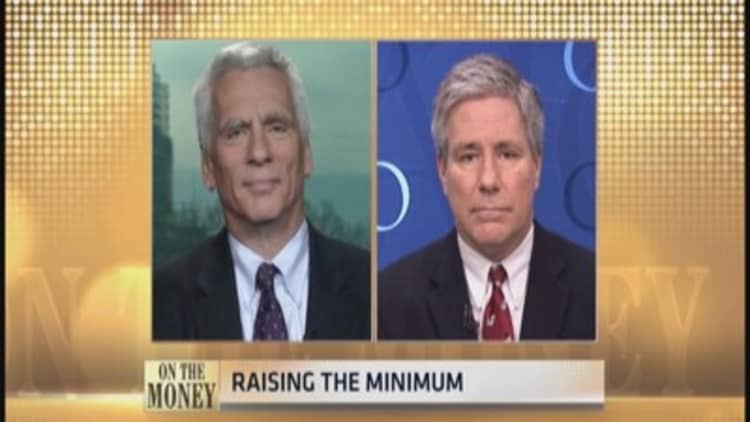
More than 3 million Americans just got a raise.
When Jan. 1 arrived, numerous states increased their minimum wage. The pay hikes in each state range from Florida's 12 cent cost-of-living increase, to South Dakota's $1.25 hourly wage hike. Still, there's a wide gulf between those who think wage policies will help the economy, and those who think it will hurt workers.
In an interview with CNBC, Jared Bernstein, former economic advisor to Vice President Joe Biden, said the higher minimum wage gives a boost to lower-paid workers.
"While the economy has been expanding and growing, very little of that growth has reached workers in bottom half of the pay scale," the progressive economist said.
Others see the opposite impact. Dan Mitchell of the libertarian Cato Institute told CNBC the result of higher minimum wages means some people are going to be thrown out of work. Conservative economists have long argued that raising the minimum wage puts a strain on small businesses, and may price entry-level workers out of the job market.
Read More
"It's a simple reality. If a low-skill employee doesn't have the work skills that justify a (minimum) wage at 'x,' they're not going to be hired," Mitchell said.
"They're going to be let go."
Federal government: $7.25 since 2009
In his State of the Union address last January, President Barack Obama called on the GOP-led Congress to increase the federal minimum wage to $10.10, to be phased in over three years. Lawmakers, however, have resisted the call to action.
With the federal minimum wage remaining at $7.25 since July 2009, states have been taking up the issue through ballot measures and legislation.
"Movement for states setting their own minimum wages makes sense," said Bernstein, senior fellow at the Center on Budget and Policy Priorities. "Price differences are really quite dramatic across the country."
Mitchell actually agrees, but carries the issue further. "We should get rid of the minimum wage law in Washington and let the 50 states decide what's the best policy. "
Now 29 states—a majority of the country—have a higher minimum wage than the federal rate.
CBO weighs in
Last summer, the nonpartisan Congressional Budget Office study estimated if a federal minimum wage of $10.10 were enacted, 500,000 workers would lose their jobs. However, the agency also said 24.5 million workers would get raises.
"I'm not saying nobody ever gets hurt with a minimum wage increase," said Bernstein. "There's no perfect policy, but here's a policy with 49-to-1 benefits, which looks very good to the people voting for it. "
Read MoreMinimum wage will help economy: Advocate
Yet it's not just states that are raising minimum wages. Cities have been mandating increases in referendums and legislation. In 2013, SeaTac in Washington state raised its rate to $15, becoming the highest city minimum wage in the nation.
Elsewhere, cities and states are pushing ahead with plans to make the minimum wage more amenable for their workers.
Voters in San Francisco and Oakland approved a minimum wage pay hike of $12.25 beginning later this year.
Chicago will increase its minimum to $10 an hour beginning in July.
—On the Money airs on CNBC Sundays at 7:30 pm, or check listings for air times in local markets.



